The People Who Never Gave up on Sonic: A Deep Dive Into the Most Curious (and Passionate) Fandom on the Internet
Despite a flurry of critically panned games, fans have stuck with the speedy blue hedgehog.
This article first appeared on USgamer, a partner publication of VG247. Some content, such as this article, has been migrated to VG247 for posterity after USgamer's closure - but it has not been edited or further vetted by the VG247 team.
Sonic theoretically should have died with Sonic the Hedgehog, or what fans often dub "Sonic '06." Sonic '06 was a notable disaster in the lineage of Sonic's history. It bears a 46 on Metacritic and 4.3 score on the User Score end. It's a game that still has its fans—like the people who grew up with it, the critics who engage with it on a deeper level, or those who played it as their entry point into Sonic—but by and large, most lament its existence.
"For any other game community, Sonic '06 or any game equivalent like that in any other franchise would have been the absolute, 100 percent killing blow," Sonic subreddit moderator David Manzolillo told me over Discord. "Something as catastrophically bad as that would have just ended pretty much anything else."
But somehow it didn't, and a lot of that is down to the fans.
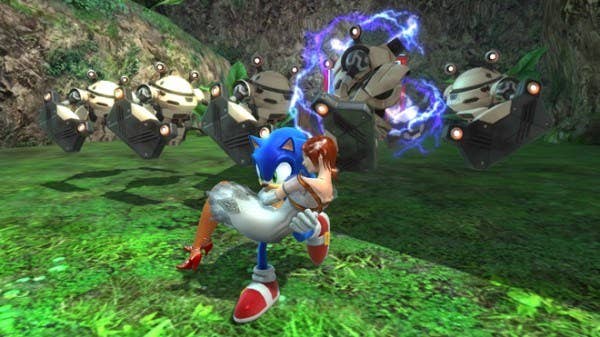
After a long, difficult decade, the tide has started to turn for the series and the fans alike. Sonic Mania was released this past Tuesday to both fans' praise and critical acclaim. It's a Sonic game hearkening back to its 2D platforming roots for the first time since the Sonic Advance series. It's a game that's crafted in a delicate loving way, unlike the shapeless, nostalgia-grab of Sonic Generations. One important note is that it's not made by Sega's in-house Sonic Team. In fact, it's developed by fans of the series themselves: former modders, hackers, fan musicians. Sonic Mania is a game dreamed up and built wholly by fans. It feels like a celebration of a Sonic seemingly long gone.
But it was never really gone. It's been alive in the hearts of fans and their creations for some time. It existed in the hearts of the developers, always, and it's how Sonic Mania even materialized today.
The Sonic fandom is a varied one, scattered into various groups like the hardcore 2D crowd on the fan forums Sonic Retro, the "Adventure games are number one" choir elsewhere, and so on. It's a fandom that bewilders outsiders. As a result, many love to mock Sonic's fan culture. It was a popular target in GFW Radio's "Hero of the Web" segment, where host Shawn Elliott read aloud stories of fans marrying Sonic. Making fun of Sonic's hardcore fans has become so prevalent that it's practically become entwined with the conversation around the games. For instance, the articles about Sonic the Hedgehog on Encyclopedia Dramatica, despite being the cesspool that it is, tend to typify an inherently negative attitude toward Sonic. Some even reckon its old school Sega Genesis games are overrated. And yet, here is a community that's still popping off.
The official Sonic subreddit is a rare blend of all types of fans—the more "mellow" type, Manzolillo tells me. Players who are ready to debate or insist that more maligned games aren't so bad after all, but won't die on a hill for them necessarily. The common thread is that Sonic fans are by and large accepting of others, no matter their opinions, their backgrounds, or whatever else. It's a shared space of not only measured reflection, but acceptance of all.
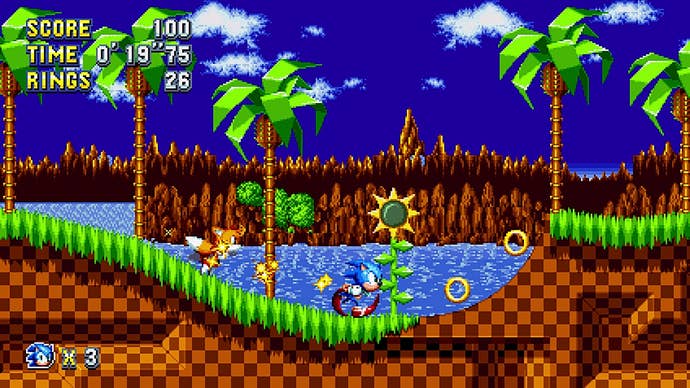
Sonic subreddit moderator Efrain Astorga, also known as Fay online, spoke to me through Discord alongside Manzolillo. "Everybody has very different points of view about the games, but they're all respected," said Fay. "[That's] something I don't necessarily see in a lot of game [communities]. Something that among the people from the community do think, and actually do respect [others]."
Everyone's road to a series they love is different, and for Sonic, the same is true. When I was a Sonic fan as a kid, I watched my mom and her roommates play through the games on our clunky CRT. When I was older, I controlled the blue hedgehog myself in Sonic 2 first, enamored by his speed. For others that I spoke to over the past week, their roads were all different too. Some didn't get into the series until well into the 3D entries, starting everywhere from Sonic Adventure 2 to Sonic '06. Others grew up on the Genesis games, fell off, and came back later. Some simply bought some goofy Sonic-themed clothes only for the stylish hedgehog to taunt them face to face every day until they caved as a serious-minded fan.
"Mystery and mistake really breeds fandom."
Eventually those roads seem to lead to creativity. Fans writing their own fan fiction, drawing their own fan art. Yet these are regular things for most dedicated fan communities. However Sonic's goes deeper and more peculiar than that: creating original characters (also known as OCs) to embed themselves into the narratives they love or want to improve, writing fan music, engaging with the games on a surprising deeper critical level, or like children's book author Caleb Zane-Huett and indie game developer Nick Splendorr: starting a podcast dedicated to the rolling animals.
"Mystery and mistake really breeds fandom," said Zane-Huett. "Sonic is like a bunch of very strange choices, a bunch of very very weird decisions all piled together in a world that most of the time makes absolutely no effort to explain itself. When it does make effort to explain itself, it often does such a bad job that it's easy to disregard. So it creates this really great space for fans to put themselves on the narrative, and put themselves in the world. That's where the OC culture comes from."
Sonic's always been the sort of character who's the antithesis to Mario. As Zane-Huett theorized, Sonic as a series is built around this idea that Sonic isn't the player, but rather someone the player is just directing. Mario has no fourth-wall breaking, he runs and jumps with no qualms. Sonic grows impatient, wags his finger, stares at the player with annoyance through the screen. "The game does a lot to make Sonic not be you, which [makes] you think okay if he is not me, then who am I in that world? How do I relate to it," said Zane-Huett. "And then people create their own characters and engage in that way or want to write a different story where they're friends with Sonic," added Splendorr. "Like a lot of people become Sonic's companion, rather than Sonic himself." People didn't identify with Sonic. They identified with his friendships with others. Essentially, they wanted in on the companionship.
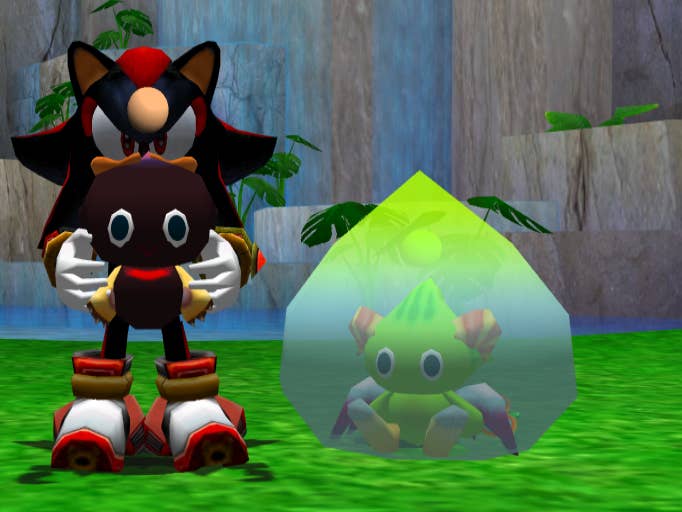
Zane-Huett and Splendorr host the weekly podcast You're Too Show, described by itself as an "investigation into the silly world of Sonic." Zane-Huett and Splendorr pitch it to me as an educational type of podcast, where instead of them being the sort of academic-professor types spouting knowledge, they're learning about Sonic right alongside the listener. Their project isn't unlike many creatives in the Sonic fandom: only they're wielding words instead of pens.
For all the fumbles in Sonic's lineage, at the very least, Sonic's remained consistent with trying new things and being experimental with its own ever-changing mythos. One game may wrestle with grittier themes, where another embraces its silly side. One game may have Sonic as a time traveler. Another where he races on boards, not on his own two feet. In one game, Sonic is stripped of his signature asset, where he can't even run. Splendorr compares the Sonic series to Star Wars, another epic transmedia project. Yet where Star Wars is nearly twice Sonic's age, Sonic's somehow taken its own ever-changing universe to weirder, even fluid directions. Sonic embraces its strangeness wholeheartedly. For better or for worse.
As a result, sometimes that very strangeness doesn't always resonate with players and critics. Sonic '06, the Sonic Boom saga, Sonic Unleashed, Sonic and the Black Knight, on and on. Sonic games have largely disappointed most critics and general audiences, while finding niche fans in corners. For a while, the Sonic series looked like it was in turmoil to the outside world. In an identity crisis. But in the fandom, Sonic was anything but. Nothing dampened Sonic's spirit, nor the community's.
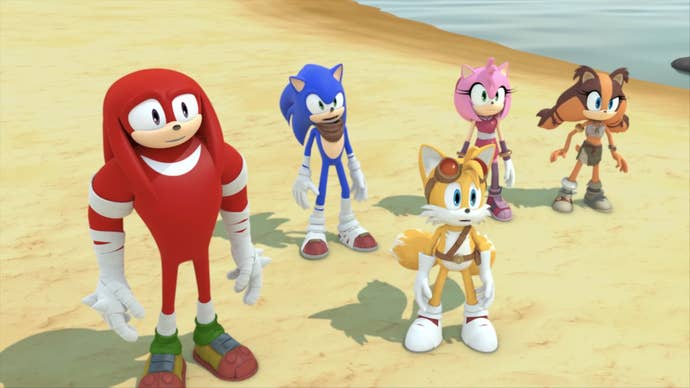
"A bunch of the people we've interacted with that have been fans for a long time, it's almost like they had to form a coalition of friends who are all there for each other because all the games are not quite," said Zane-Huett. "Because for a while there, they didn't feel like they were."
Splendorr agreed. "Yeah, it's almost like Sega were not fulfilling their end of the relationship for a while for some people," he added. "So Sonic fans banded together and were like, 'Well we're here for each other, and if Sega almost becomes the enemy at a certain point, in the mid-2000s, like ah, they've done it again. They've ruined our dream.' And so there's a kind of camaraderie that comes at that that's interesting." Sonic fans never took no for an answer, even when the games themselves failed them. Through creative work, the promise and dream of Sonic has kept alive and floating because of the community surrounding it.
A while ago, it seemed to be a trend for people to Google their name alongside the phrase "Sonic OC." Then they'd share the results on social media. The results were often a jarring look at a deep fandom most weren't directly involved with, and no name seemed off limits. Even my own name—Caty, yes, an unpopular way to spell "Katie" I guess—I remember conjuring up a critter. (Trying to replicate it now is producing no results, but trust me: a Caty Sonic OC exists somehow, somewhere.) The movement was more poking fun at the Sonic fandom, but at its core broke into something deeper: the unexpected vastness of OC creation and its primary home on the amateur art website DeviantArt. For outsiders, OCs were something to laugh at. For the Sonic community, it was a way to bring themselves closer to the overarching narrative.
OC culture being so big in the realm of Sonic gives way to the fact that Sonic's always been bigger than just games. It's why in Sonic Forces, the upcoming 3D game from the Sonic Team proper at Sega, is including its own character creator for players to bring their Sonic OCs truly to life. Beyond fan art, Sonic's reach expands to cartoons and comics too.
For critic Zolani Stewart, the comics are a favorite. Stewart would scribble thoughts he had on specific panels, sections, images alongside the self-coined hashtag "#SonicStudies," a phrase most now associate with his work. It wasn't just one specific comic that incited a shift for Stewart, but a realization that Sonic was a lot more layered and had far more potential than he realized.
"The culture really believes in itself more than it believes in naysayers."
Tweeting about the Sonic comics got the attention of the fellow gaming outlet Kotaku eventually, where Stewart ended up writing a piece about Sonic's perceived downfall. The publication of the article came at a grim time in Stewart's life though—right as he was attending a funeral for his aunt. It was a Caribbean funeral, what Stewart describes to me as being darkly "ironic," watching his relatives joyously danced to Calypso music alongside his aunt's casket. Almost on cue, Stewart got a text from a friend. His Kotaku article was published. Stewart was now, at this very inopportune time, published on a major gaming website for a legitimate article involving Sonic the Hedgehog. "It was really strange and morbid, this piece that was such a big deal happened at such a strange time," said Stewart. "It underscores the strange dark irony of writing about Sonic."
There aren't many critics who will go on thousands-of-words defenses on the merits of Sonic '06, but Stewart's not like many critics. Still, the comics have stuck out as the most dense work in the Sonic canon in Stewart's opinion. "Sonic as a media I don't think has ever done anything as creatively ambitious and creatively successful [as the comics]," said Stewart, regarding the recent news that the Archie line of Sonic comics will be folding after over two decades in publication. "You know being ambitious is one thing, just doing a bunch of stuff, throwing ideas and hoping it sticks, but really having a vision. That's something that I feel like any Sonic video game can aspire to in the comic books."
The Sonic fandom has shown itself to be resilient against all odds and even backlash. Like the Sonic subreddit mods told me, for virtually any other series Sonic '06 would have been the nail in the coffin in the face of already-alienating 3D games in the franchise. But it wasn't. Instead the community looked past it, splintering into many subcommunities and diversifying immensely among itself. The Sonic community is one where any type of fan can thrive, and feel accepted. Part of that is because of its largely diverse fan base, and the fact that they're almost the underdogs of staple fandoms.
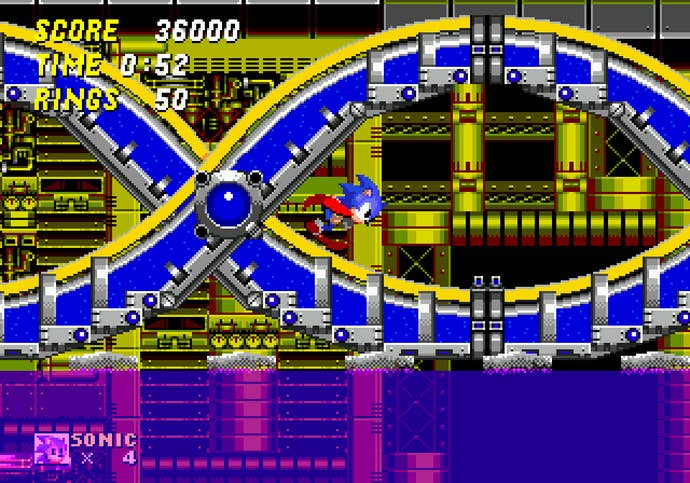
"The queer fan art spaces are really really important," Stewart specifically noted. "Especially women making fan art as well. I think that's what took Sonic fan art out of its slump. That's the reason why the Sonic fan art [in recent years] has become less cynical, less close-minded, less myopic. Because the Sonic fandom could have been a bunch of old guys who loved the Genesis, sitting around and making their hacks and stuff, but it's not that. I see a fandom that has a forward thinking vision of Sonic, and I think the queer fan art community really deserves a lot of credit for that."
Artists like Jennifer Hernandez have sometimes even used Sonic fan art as a springboard into bigger career opportunities. Hernandez found herself contracted to work on the Sonic comics for a time as a result of her fan art. For others who got their start sketching messy OCs on DeviantArt, they've mastered their art to grow into better, truly impressive artists. Through Sonic, artists and other creatives found their way.
"That's why this fan art scene is so big," said Stewart. "[Fans seeing] the vision of what [they want to make], and that vision [being] unbreakable. The culture really believes in itself more than it believes in naysayers." For a lot of Sonic fans, in between debating the merits of some games compared to others, realizing their own visions is what puts the community a step above most others and confounds outsiders to its popularity. Like a joke that no one else is in on except for thousands of diehard inventive fans. It's the reason it's sustained itself even as the primary medium it was born from has mostly faltered in the public eye.
In the closest communities, sharing art, fan fiction, and whatever else between one another basically adds to the grander narrative of Sonic's role in the world itself. Players may not be satisfied by every waking game, but dammit, they'll enjoy a fan-composed tune or too in the meantime. They don't even really need a game like Sonic Mania. If anything, Sonic Mania's just the cherry on top of the glowing reality of Sonic they've built and sustained for themselves.

